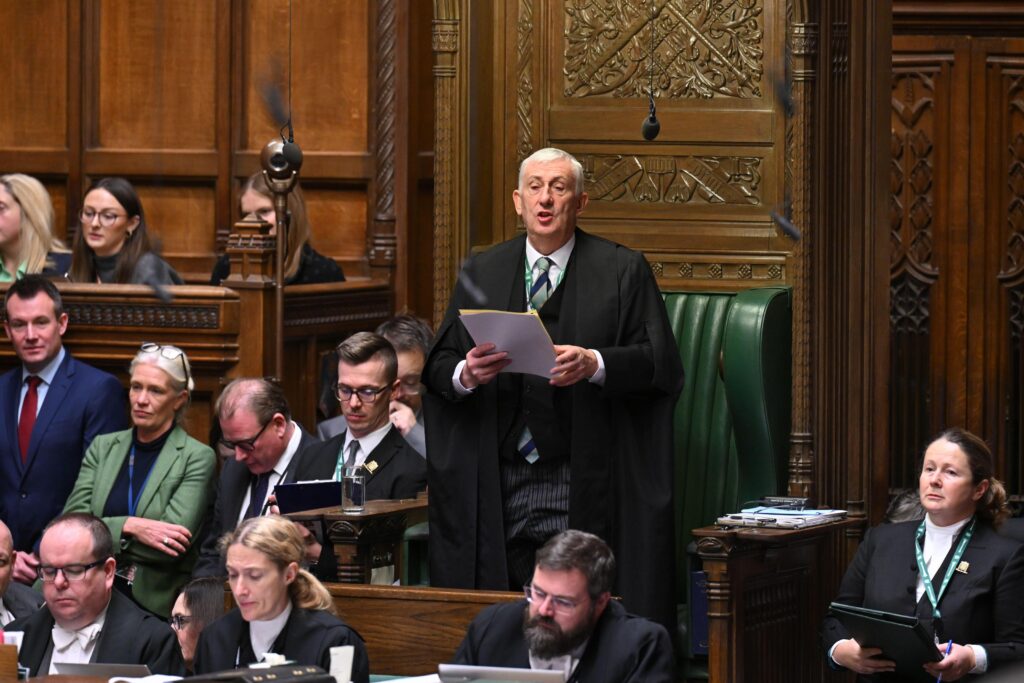The number of MPs to have signed a motion of no confidence in House of Commons Speaker Sir Lindsay Hoyle has now increased to 93.
It is an Early Day Motion (EDM), which allows MPs to state a position on any topic.
The motion reads simply: “That this House has no confidence in Mr Speaker.”
The latest uptick in signatories comes after parliament’s three Plaid Cymru MPs backed the motion, with group leader Liz Saville Roberts citing a “fundamental disregard for smaller parties in Westminster”.


The EDM was proposed last week by Conservative MP William Wragg. Wragg is a senior Conservative who chairs the House of Commons’ public administration and constitutional affairs committee.
Speaker Lindsay Hoyle retracts offer to SNP of emergency Gaza ceasefire debate
Sir Graham Brady, who is in charge of the powerful backbench 1922 Committee, was another senior MP among the early signatories.
Other signatories on the Conservative benches include Lee Anderson, Brendan Clarke-Smith, Sir Geoffrey Clifton-Brown and Sir James Duddridge.
On the SNP benches, the party’s home affairs spokesperson Alison Thewliss has signed, alongside Joanna Cherry and the party’s Westminster leader Stephen Flynn.
It comes after the Speaker rejected a bid by the SNP to hold a fresh debate on a ceasefire in Gaza on Monday, just days after saying he would allow one under an arcane parliamentary procedure known as Standing Order 24 (SO24).
Ahead of an SNP opposition day debate on a Gaza ceasefire last week, Sir Lindsay broke with convention by accepting both Labour and government amendments to the SNP’s Gaza ceasefire motion.
The convention has been that if the government tabled an amendment to an opposition day motion, amendments from other parties would not be accepted.
Leader of the House of Commons Penny Mordaunt subsequently accused Sir Lindsay of having “undermined the confidence” of the House
She confirmed the government would pull its amendment and would not be taking part in tonight’s votes.
SNP Westminster leader Stephen Flynn then demanded his party’s motion be put to a vote before the Labour amendment.
This did not happen and the Labour amendment – and then the Labour-amended motion calling for a “humanitarian ceasefire in Gaza” – was carried by “voice vote” in the House of Commons. That is despite the protestations of some Conservative and SNP MPs.
In a statement to the House of Commons on Wednesday evening, the speaker said: “I wanted to do the best by every member of the House”
“I regret how it’s ended up. It was not my intention. I wanted all to ensure they could express their views. As it was, in particularly the SNP, were unable to vote on their own proposition.
“It is with my sadness that it ended in this position. It was never my intention. I recognise the strength of feeling of this house and its members. I will reflect on my part in that. I do not want it to have ended like this.”
Responding to the statement, Stephen Flynn acknowledged the speaker’s apology but added that he was warned that his decision would lead to the SNP not having a vote.
“I am afraid that is treating myself and my colleagues in the SNP with complete and utter contempt.”
He closed: “I will take significant convincing that your position is not now intolerable.”
Gaza ceasefire vote: SNP says Speaker’s position is ‘intolerable’ amid chaotic scenes
Politics.co.uk is the UK’s leading digital-only political website, providing comprehensive coverage of UK politics. Subscribe to our daily newsletter here.












